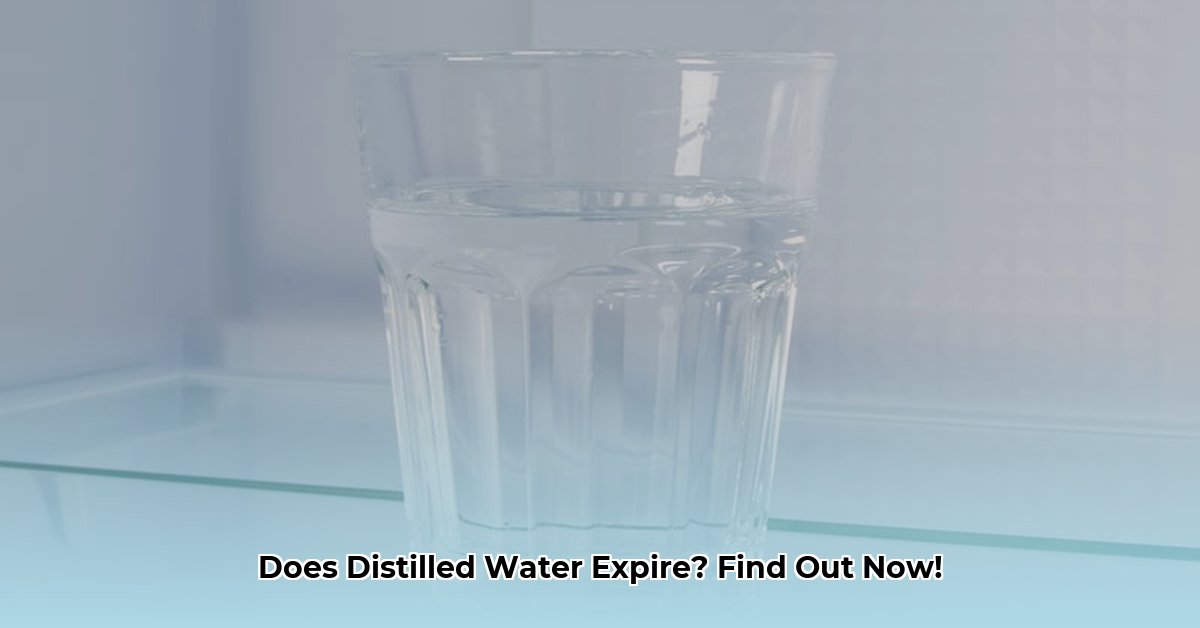Distilled water—it’s pure, clean, and essential for various household uses. But does it last forever? Unlike juice or milk, distilled water doesn’t spoil in the traditional sense. It won’t grow mold or curdle. Instead, the primary concern is contamination. This comprehensive guide provides a definitive resource for safely storing and using distilled water.
Understanding Distilled Water and Contamination
Distilled water is created through a process of boiling and condensation, which removes impurities like minerals, bacteria, and other substances. This process, while creating pure water, also makes it highly susceptible to absorbing substances from its environment. Think of it like a pristine, empty room—it stays clean until dust and dirt find their way in.
Spotting Contamination: Is Your Distilled Water Safe?
How can you tell if your distilled water has been compromised? Here are some telltale signs:
- Cloudiness: Clear distilled water should be just that—clear. Any murkiness or haziness suggests contamination.
- Sediment: Notice any floating particles or sediment at the bottom? That’s another sign of potential contamination.
- Unusual Odor: Distilled water should be odorless. A musty, metallic, or any other unusual smell is a red flag.
- Strange Taste: While not recommended with potentially contaminated water, a tiny sip can sometimes reveal a strange flavor. However, if you suspect contamination, prioritize safety and discard the water.
Risks of Drinking Contaminated Water
While the effects of drinking lightly contaminated distilled water might be mild for some (like a slight stomach upset), others, especially those with weakened immune systems, could experience more serious health problems. It’s always better to err on the side of caution and avoid drinking water that shows any signs of impurity.
Storing Distilled Water: A Step-by-Step Guide
Proper storage is crucial for maintaining the purity of distilled water. Here’s a comprehensive guide:
-
Choose the Right Container: Opt for food-grade glass containers for long-term storage. Glass is chemically inert, meaning it won’t leach substances into the water over time. High-quality, BPA-free plastic is suitable for shorter-term storage.
-
Prepare the Container: Even new containers should be thoroughly washed with hot, soapy water and rinsed completely before use. For extra precaution, sterilize glass containers by boiling them for a few minutes.
-
Fill and Seal: Fill the container almost to the top, leaving minimal air space to reduce the risk of airborne contamination. Ensure a tight seal with a properly fitting lid.
-
Store in a Cool, Dark Place: Find a location away from direct sunlight, heat, and household chemicals. A pantry, cupboard, or cool, dark basement are ideal. While unopened distilled water doesn’t require refrigeration, refrigeration can help maintain its quality after opening.
Shelf Life of Distilled Water
Distilled water doesn’t have a true expiration date in the same way food does. However, its purity can degrade over time due to potential contamination. Here’s a general guideline:
| Storage Scenario | Estimated Shelf Life | Notes |
|---|---|---|
| Unopened, Glass Container | Indefinitely (check “Best By” Date) | While theoretically lasting indefinitely, manufacturers often provide a “Best By” date. Always inspect the water for signs of contamination. |
| Opened, Glass Container | 6-12 months | Refrigerating opened distilled water might extend its usability. |
| Opened, Plastic Container | 1-2 months (refrigeration might extend usability) | Prioritize using opened plastic containers of distilled water as quickly as possible. |
| Baby Formula | 24-48 Hours | Always use fresh distilled water for baby formula, discarding any leftovers. |
| CPAP Machines, Humidifiers | 24 Hours | Daily changes are crucial to minimize bacterial growth in these devices. |
Specific Use Cases: CPAP, Humidifiers, Baby Formula
These applications require extra vigilance due to the increased risk of bacterial growth and the potential impact on health, especially for infants and those with respiratory issues. Always adhere to manufacturer instructions for cleaning and water replacement.
- CPAP Machines: Daily cleaning and fresh distilled water are paramount to prevent respiratory infections.
- Humidifiers: Regular cleaning and fresh water every 1-2 days minimize bacterial growth.
- Baby Formula: Use freshly opened, properly stored distilled water for each preparation and never reuse leftovers.
Cleaning Contaminated Containers
If you suspect contamination, you can often salvage the container with a thorough cleaning:
- Wash: Wash thoroughly with hot, soapy water.
- Rinse: Rinse repeatedly to remove all soap residue.
- Sterilize (Optional): For added precaution, sterilize glass containers by boiling them for several minutes.
- Air Dry: Allow the container to air dry completely before refilling with fresh distilled water. For plastic containers, avoid using strong chemicals and instead opt for vinegar or baking soda solutions to remove stubborn residues.
Frequently Asked Questions
-
Are all types of purified water the same? No. Purification methods like reverse osmosis, deionization, and filtration produce different types of purified water, each with varying levels of mineral and impurity removal. Some ongoing research suggests specific health effects from long-term consumption of low-mineral content water, so it’s always a good idea to stay informed and consult your doctor with any questions you may have.
-
Is it healthy to drink only distilled water long-term? While distilled water is safe to drink in moderation, exclusive, long-term consumption can lead to mineral deficiencies. A balanced diet and varied water sources are recommended for optimal health. If you have specific dietary concerns, talk to your doctor or a registered dietitian about your individual hydration needs.
Conclusion
Distilled water offers numerous benefits for various applications, but proper storage and handling are essential to maintain its purity and safety. By following this guide, you can ensure your distilled water remains contaminant-free and suitable for its intended use. Always prioritize safety and consult your doctor if you experience any health issues related to water consumption.
- Food Making Kits Bring Easy, Fun Homemade Dishes to Your Kitchen - February 5, 2026
- Cooking Kits Make Mastering New Recipes Fun for Everyone - February 4, 2026
- Leak-Proof Glass Food Containers with Locking Lids Keep Food Fresh - February 3, 2026










